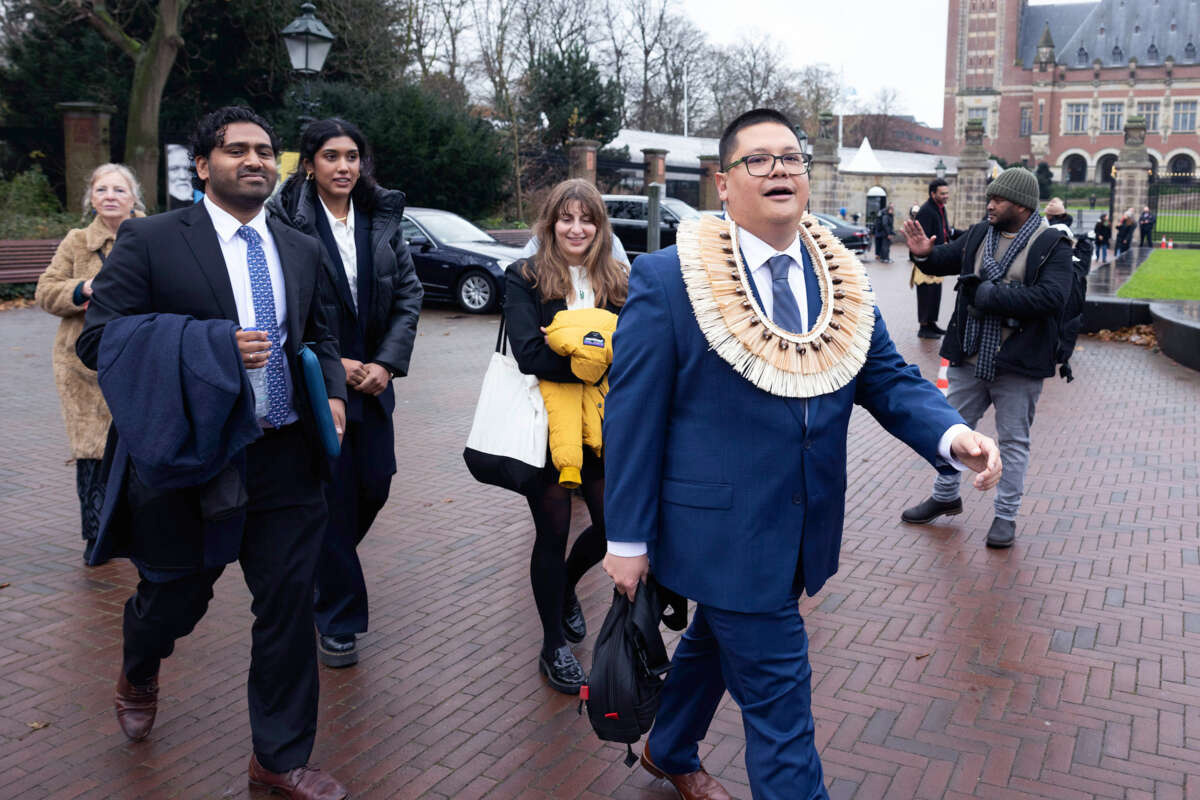The International Court of Justice (ICJ) heard arguments Monday in the largest climate case ever brought before it as a coalition of low-lying and developing nations demanded larger polluting nations be held to account under international law for causing “significant harm to the climate system and other parts of the environment” with runaway fossil fuel emissions over recent decades.
In the first day of hearings in The Hague that could last weeks, multiple representatives from the Pacific island of Vanuatu, which is leading the coalition of over 100 countries and allied organizations, laid the blame for the climate crisis at the feet of a small number of states that are large emitters of greenhouse gases.
“We know what the cause of climate change is: a conduct of specific States … Vanuatu’s contribution to global greenhouse gas emissions is negligible, and yet we are among those most affected by climate change,” said Arnold Kiel Loughman, attorney general of the Republic of Vanuatu.
“We find ourselves on the frontlines of a crisis we did not create,” Ralph Regenvanu, Vanuatu’s special envoy for climate change and environment, told the court.
Monday’s historic moment at The Hague follows years of work on the part of Pacific Island nations, particularly Vanuatu, to push for the ICJ to take up the issue of global warming and human rights. The stakes of the planetary emergency are particularly high for these countries, which are under threat from rising seas and other climate impacts.
Ilan Kiloe, legal counsel for the Melanesian Spearhead Group, a regional subgroup that includes Fiji, Papua New Guinea, Solomon Islands, and Vanuatu, issued a stark warning during his remarks to the court: “Climate change is now depriving our peoples, again, of our ability to enjoy our right to self-determination in our lands. The harsh reality is that many of our people will not survive.”
Last year, the United Nations General Assembly unanimously adopted a resolution calling on the ICJ to issue an advisory opinion on climate change and human rights. The measure, which was introduced by Vanuatu and co-sponsored by more than 130 governments, requested that the world’s highest court outline countries’ legal responsibilities for combatting fossil fuel-driven climate change and the legal consequences of failing to meet those obligations.
Over the next two weeks, the court will hear statements from nearly 100 nations, including wealthy developed countries such as the United States. Advisory opinions, unlike judgments, are not binding—but Vanuatu and other supporters hope that a forthcoming opinion would accelerate action around the climate emergency.
The country began pushing for the ICJ resolution in 2021, following a campaign launched in 2019 by a group of students from the University of the South Pacific.
“What started in the Pacific is now a historic climate justice campaign, as the world’s most urgent problem of climate change reaches the world’s highest court,” said Shiva Gounden of Greenpeace Australia Pacific.
“The next two weeks of hearings are the culmination of collective campaigning from 2019, powerful advocacy, and mobilizing the world behind this landmark campaign, to ensure the human rights of current and future generations are protected from climate destruction, and the biggest emitters are held accountable.”
Polly Banks, Vanuatu country director for Save the Children, who travelled to The Hague for the proceedings, said that “the hearing before the Court goes to questions about the efficacy, equity and fairness of the current responses to climate change, which are particularly relevant for children, who have contributed the least to climate change but will be most affected by its consequences.”
“Currently, only 2.4% of climate finance from multilateral funding sources is child-responsive. Even without the Court’s opinion, we know that states need to do far more to protect children from the worst impacts of this crisis, by significantly increasing climate finance to uphold children’s basic rights and access to health, education and protection,” Banks added.
The start of hearings at The Hague come on the heels of a COP29 climate summit that was heavily criticized. The summit focused heavily on climate finance, but the resulting deal was panned by critics as rich nations agreed to voluntarily provide just $300 billion to help developing nations decarbonize and deal with the impacts of the climate emergency. Poor nations and climate campaigners had demanded over a trillion dollars in funding in the form of debt-free grants and direct payments.
We’re resisting Trump’s authoritarian pressure.
As the Trump administration moves a mile-a-minute to implement right-wing policies and sow confusion, reliable news is an absolute must.
Truthout is working diligently to combat the fear and chaos that pervades the political moment. We’re requesting your support at this moment because we need it – your monthly gift allows us to publish uncensored, nonprofit news that speaks with clarity and truth in a moment when confusion and misinformation are rampant. As well, we’re looking with hope at the material action community activists are taking. We’re uplifting mutual aid projects, the life-sustaining work of immigrant and labor organizers, and other shows of solidarity that resist the authoritarian pressure of the Trump administration.
As we work to dispel the atmosphere of political despair, we ask that you contribute to our journalism. Over 80 percent of Truthout’s funding comes from small individual donations from our community of readers, and over a third of our total budget is supported by recurring monthly donors.
You can help by giving today. Whether you can make a small monthly donation or a larger gift, Truthout only works with your support.
